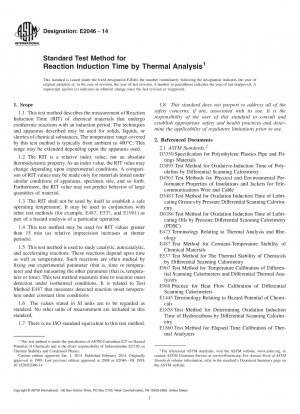ASTM E2046-14
Standard Test Method for Reaction Induction Time by Thermal Analysis
- Standard No.
- ASTM E2046-14
- Release Date
- 2014
- Published By
- American Society for Testing and Materials (ASTM)
- Status
- Replace By
- ASTM E2046-19
- Latest
- ASTM E2046-19
- Scope
5.1 This test method measures the time to extrapolated onset of an exothermic reaction under constant temperature (isothermal) conditions for reactions which have an induction period, for example, those which are catalytic, autocatalytic, or accelerating in nature or which contain reaction inhibitors.
5.2 The RIT determined by this test method is an index measurement that is useful for comparing one material to another at the test temperature of interest and in the same apparatus type only.
5.3 This test method is a useful adjunct to dynamic thermal tests, such as Test Method E537, which are performed under conditions in which the sample temperature is increased continuously at constant rate. Results obtained under dynamic test conditions may result in higher estimates of temperature at which an exothermic reaction initiates because the detected onset temperature is dependent upon the heating rate and because dynamic methods allow insufficient time for autocatalytic reactions to measurably affect the onset temperature.
5.4 RIT values determined under a series of isothermal test conditions may be plotted as their logarithm versus the reciprocal of the absolute temperature to produce a plot, the slope of which is proportional to the activation energy of the reaction as described in Test Method E2070.
5.5 This test method may be used in research and development, manufacturing, process and quality control, and regulatory compliance.
5.6 This test method is similar to that for Oxidation Induction Time (OIT) (for example, Specification D3350 and Test Methods D3895, D4565, D5483, D6186, and E1858) where the time to the oxidation reaction under isothermal test conditions is measured. The OIT test method measures the presence of antioxidant packages and is a relative measurement of a material's resistance to oxidation.
1.1 This test method describes the measurement of Reaction Induction Time (RIT) of chemical materials that undergo exothermic reactions with an induction period. The techniques and apparatus described may be used for solids, liquids, or slurries of chemical substances. The temperature range covered by this test method is typically from ambient to 400°C. This range may be extended depending upon the apparatus used.
1.2 The RIT is a relative index value, not an absolute thermodynamic property. As an index value, the RIT value may change depending upon experimental conditions. A comparison of RIT values may be made only for materials tested under similar conditions of apparatus, specimen size, and so forth. Furthermore, the RIT value may not predict behavior of large quantities of material.
1.3 The RIT shall not be used by itself to establish a safe operating temperature. It may be used in conjunction with other test methods (for example, E487, E537, and E1981) as part of a hazard analysis of a particular operation.
1.4 This test method may be used for RIT values greater than 15 min (as relative imprecision increases at shorter periods).
1.5 This test method is used to study catalytic, autocatalytic, and accelerating reactions. These reactions depend upon time as well as temperature. Such reactions are often studied by fixing one experimental parameter (that is, time or temperature) and then measuring the other parameter (that is, temperature or ......
ASTM E2046-14 Referenced Document
- ASTM D3350 Standard Specification for Polyethylene Plastics Pipe and Fittings Materials*, 2024-04-20 Update
- ASTM D3895 Standard Test Method for Oxidative-Induction Time of Polyolefins by Differential Scanning Calorimetry
- ASTM D4565 Standard Test Methods for Physical and Environmental Performance Properties of Insulations and Jackets for Telecommunications Wire and Cable
- ASTM D5483 Standard Test Method for Oxidation Induction Time of Lubricating Greases by Pressure Differential Scanning Calorimetry
- ASTM D6186 Standard Test Method for Oxidation Induction Time of Lubricating Oils by Pressure Differential Scanning Calorimetry (PDSC)
- ASTM E1445 Standard Terminology Relating to Hazardous Potential of Chemicals
- ASTM E1858 Standard Test Method for Determining Oxidation Induction Time of Hydrocarbons by Differential Scanning Calirometry
- ASTM E1860 Standard Test Method for Elapsed Time Calibration Thermal Analyzers
- ASTM E1981 Standard Guide for Assessing Thermal Stability of Materials by Methods of Accelerating Rate Calorimetry
- ASTM E2070 Standard Test Methods for Kinetic Parameters by Differential Scanning Calorimetry Using Isothermal Methods
- ASTM E473 Standard Terminology Relating to Thermal Analysis
- ASTM E487 Standard Test Method for Constant-Temperature Stability Of Chemical Materials
- ASTM E537 Standard Test Method for Assessing the Thermal Stability of Chemicals By Methods of Thermal Analysis
- ASTM E967 Standard Practice for Temperature Calibration of Differential Scanning Calorimeters and Differential Thermal Analyzers
- ASTM E968 Standard Practice for Heat Flow Calibration of Differential Scanning Calorimeters
ASTM E2046-14 history
- 2019 ASTM E2046-19 Standard Test Method for Reaction Induction Time by Thermal Analysis
- 2014 ASTM E2046-14 Standard Test Method for Reaction Induction Time by Thermal Analysis
- 2008 ASTM E2046-08 Standard Test Method for Reaction Induction Time by Thermal Analysis
- 2003 ASTM E2046-03 Standard Test Method for Reaction Induction Time by Thermal Analysis
- 1999 ASTM E2046-99 Standard Test Method for Reaction Induction Time by Thermal Analysis

Copyright ©2024 All Rights Reserved